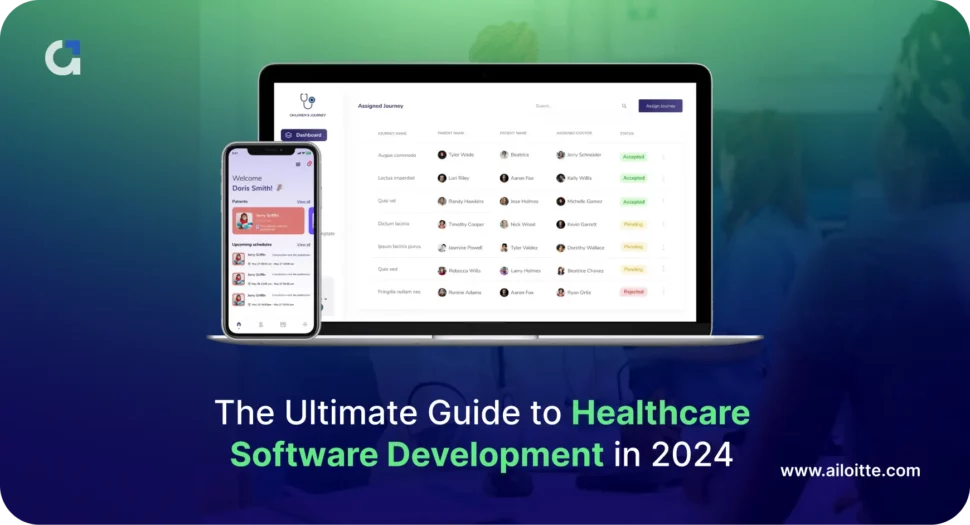
Healthcare software is essential nowadays and a main component of current medicine. Various causes determine such growth. First, it ensures efficiency in the work of medical professionals by doing routine tasks and structuring clinical flows which will free more time for medical practitioners to attend to patients. Moreover, software such as electronic health records provides a complete view of the patient’s datasets which is helpful in making exact diagnoses and the process of patient planning.
At the end, innovations in fields such as telemedicine and remote monitoring systems give patients the capability to become more engaged healthcare users and bring up care quality.
The healthcare software industry is showing higher growth. According to the research, the market sales of global healthcare IT in 2022 exceeded $394.6 billion, and it is estimated that this sum will grow to approximately $1 trillion by 2027 with a CAGR of nearly 20%. These statistics evidence the blending of technology which gives healthcare delivery, efficiency, and patient results.
So, what is healthcare software development? Are there any advantages? What are the demands of the future technologies such as AI, IoT, ML, and so in healthcare software development? If you wish to discover the virtual world of digital health, this is the place to begin.
In short, this reference material will serve as a guide to help you understand everything about healthcare software development and the strategy to effect successful digital transformation in healthcare.
So, let’s get started!
What is Healthcare Software Development?
Healthcare software development is the process of designing and developing computer programs that can be applied in the healthcare sector to improve productivity, data accuracy, and the health quality of patients. It includes many applications used by various stakeholders, including:
- Patients: Online appointment scheduling, telehealth interfaces, medication management tools, trackable wearable devices and personal health portals for access to the medical records.
- Medical Professionals: EHRs, the ones for storing and managing patient data, diagnostic tools, telehealth platforms for online consultations, and practice management software are some of the most common examples of the applications of technology in medicine.
- Healthcare Organizations: Hospital information systems (HIS) for centralized hospital operations, population health management software for tracking and improving community health outcomes and laboratory information systems (LIMS) for smooth processing of laboratory tests.
Different Types of Healthcare Software Development
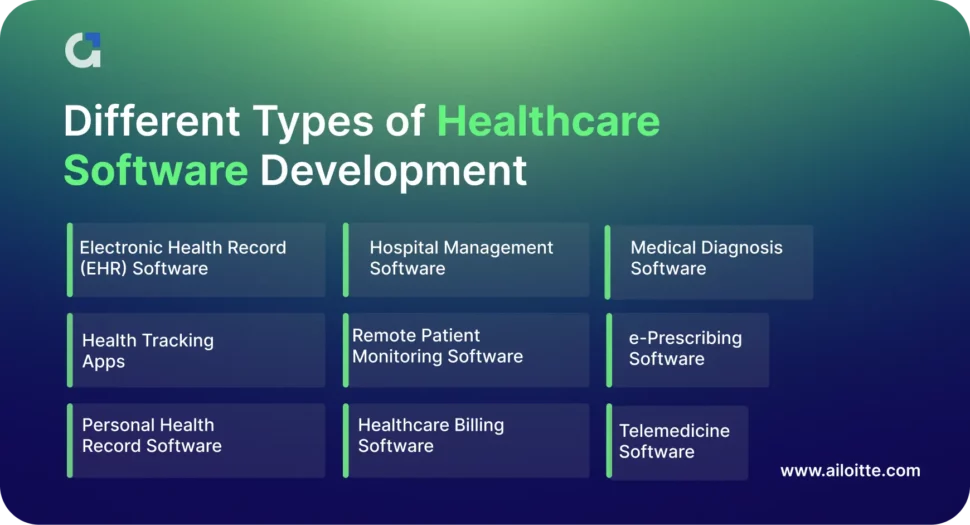
Healthcare software development represents a discipline which includes various applications created for the purpose of enhancing the quality of medical care services. Some of the different types of medical software include:
Electronic Health Record (EHR) Software
EHRs are the patient’s medical history in the digital form. These systems make it possible for healthcare IT service providers to monitor patient care status across time, including the medications, allergies, immunizations, diagnoses, and procedures that patients went through. EHR Software Development can raise the level of medicine as doctors get the best possible view of a patient’s health.\
Telemedicine Software
Telemedicine software services help healthcare providers communicate with patients via video calling or other means over a great distance. This can be applied in many ways, including an urgent care visit, a mental health review, or just chronic disease management. Telemedicine App Development could increase the accessibility of medical care for patients who live in distant areas or have difficulty with transportation for visiting the health clinic places.
Hospital Management Software
An integrated information management system, Hospital Management Software (HMS), controls all the areas of hospital functioning. It provides functions for patient registration, billing, scheduling of appointments, stock management, and so on. Through HMS, hospitals can gain larger output and better use of their resources.
Health Tracking Apps
Health tracking apps allow the patients in real-time health data collecting as they can track weight, blood pressure, and glucose levels. Such app integrated tools can help the patients to maintain their motivation and achieve the right track as far as their health goals are concerned.
e-Prescribing Software
e-Prescribing software authorized by doctors allows them to send prescriptions to pharmacies virtually. This can enhance precision and productivity, and it can also play a role in decreasing medication mistakes.
Remote Patient Monitoring Software
Remote patient monitoring software makes it possible for the health care providers to receive data about a patient’s health from a distance. This can be applied to detect possible complications or reduce the number of hospital admissions.
Medical Diagnosis Software
Medical diagnostic software uses artificial intelligence to allow doctors to diagnose diseases. The technology can obtain information from patients, such as medical history, symptoms and test results, suggest a diagnosis and make recommendations.
Healthcare Billing Software
Healthcare billing software is a tool that helps healthcare IT service providers with billing and coding tasks. This type of software facilitates many daily tasks, including claim creation and payment tracking.
Personal Health Record Software
Patients can store and retain their medical information using Personal Health Record (PHR) software. This will include medical history, medications, allergies, and vaccinations. PHRs will allow patients to be involved in this care and decision-making process.
The above are just a few of the additional applications for medical software being developed today. With the constant development of healthcare, it becomes more and more common to see advanced and innovative software tools coming out.
Key Trends in Healthcare Software Development for 2024
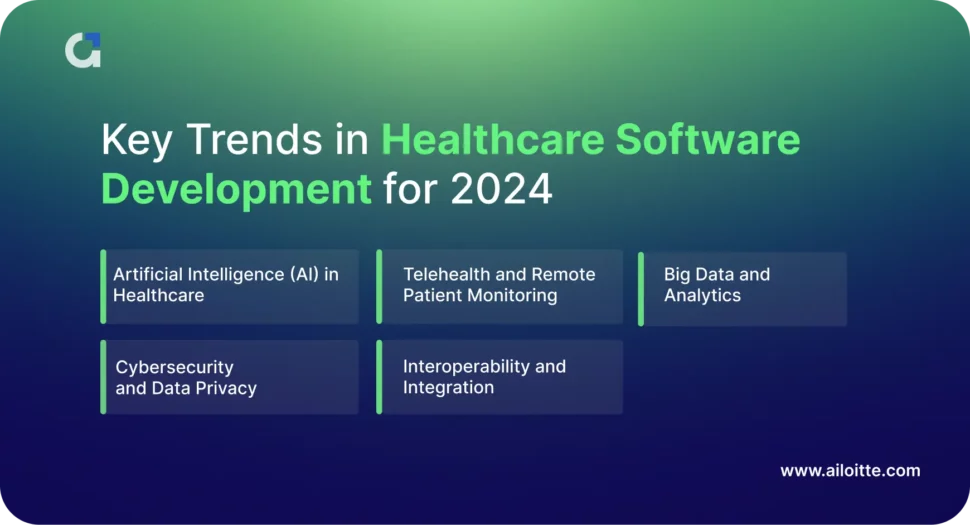
The healthcare industry is experiencing a digital transformation, and software development is at the top of this transformation. Some of the important changes that will be made in landscape design in 2024 are:
Artificial Intelligence (AI) in Healthcare:
- Diagnostics and Treatment: Since AI algorithms will go on developing, they will be used for analyzing medical images, detecting diseases at early stages, and proposing individual treatment plans.
- Drug Discovery and Development: When big data is used to analyze and search for potential drug users, the impact of intelligence on the drug discovery process will be infinite.
- Focus on Patient Engagement: Using AI-based chatbots and virtual assistants can help patients as they have 24 hours a day to solve their problems and guide them on better ways to manage their health.

Telehealth and Remote Patient Monitoring:
- Expansion of Virtual Care Services: Telemedicine platforms will be more visible because they allow patients to easily access professionals and consultations at home at a time convenient for them.
- Rise of Wearables and Remote Monitoring Devices: Integration with wearables and remote monitoring devices will provide opportunities for continuous data collection and space for health-based technology.
- Focus on Chronic Disease Management: Telemedicine can play an important role in managing chronic diseases such as diabetes and heart disease through remote monitoring.
Big Data and Analytics:
- Use big data to gain insight: The power of big data will be released in medical software, monitoring conditions, predicting outbreak, helping allocate medical resources, etc.
- Importance of Data Visualization: Clinicians need to use dashboards and data visualization tools that help extract important information from complex medical data.
- Focus on public health management: Public health organizations can analyze big data to investigate and identify at-risk populations and provide protected support accordingly.
Cybersecurity and Data Privacy:
- Strict Data Security Measures: As health information becomes more digital, careful encryption, access control, and compliance with HIPAA standards will be important.
- Focus on Patient Data Ownership: Software providers will give patients more power to access their data.
- Prioritizing User Authentication: Previous user authentication: The use of multiple authentication and other security measures is necessary to protect the confidentiality of patient information from cybercrime hackers.
Interoperability and Integration:
- Focus on Seamless Data Exchange: Medical software will seek better interoperability, allowing data to be transferred between different medical IT systems without any differences.
- Open Standards and APIs: The use of open standards and application programming interfaces (APIs) will allow seamless data sharing between different software.
- Benefits of Interoperability: Increased interoperability allows for better coordination of patient care, increased efficiency, and reduced effort.
- These are only a few of the trends that form the basis of healthcare software development in 2024. The future is what we make of it. We can all look forward to new ways to improve health, especially patient care.

Healthcare Software Development Process
The creation of healthcare software is very careful such that it complies with the regulations, interacts well within the healthcare system ecosystem and security of patients data and lives are safeguarded. This blog highlights the key stages involved in a successful healthcare software development process:
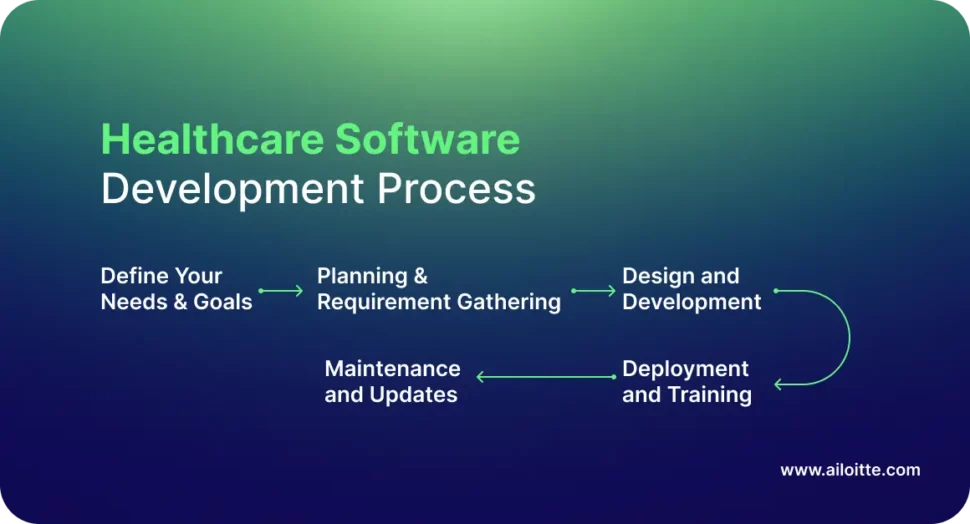
Define Your Needs and Goals:
- Identify the problem you’re trying to solve: Why will your software be only the one to address the healthcare systems’ specific needs?
- Target audience: What kind of users are you looking to target – will that be healthcare professionals, patients, or both of them?
- Desired functionalities: What are the key features and functionality required for the software development?
- Compliance considerations: Make sure your software is compliant with the relevant healthcare regulations like, HIPAA in the US and GDPR in the EU.
Planning and Requirement Gathering:
- Market research: Assess existing health-care software solutions to detect any shortcomings which your application can serve for.
- Detailed user stories and technical specifications: Create a detailed list of the software’s functions as well as technical requirements documentation.
- Identify development approach: Will you decide on developing from zero (low-code/no-code programmer) or integrate with ready-to-use third-party applications?
Design and Development:
- User Interface (UI) and User Experience (UX) Design: Empower healthcare systems by making the user interfaces simple and accessible for both tech-aware and non-tech audiences.
- Software Development: This phase operates on the assumption that the software is coded according to the set specifications, and follows secure programming practices.
- Testing and Quality Assurance (QA): Consistent software testing during development ensures that the software functions correctly, is devoid of defects and conforms to the security standards in place.
Deployment and Training:
- Deployment strategy: Determine which deployment approach works better for your organization – an on-premises, cloud-based, or hybrid model.
- User training and support: Create detailed training materials and ongoing assistance for the users, so they succeed in their work.
Maintenance and Updates:
- Bug fixes and security patching: The process of resolving any bugs and vulnerabilities that could appear after the app release is the most important task.
- New feature development: Health care environments are unstable so prepare for changes and make adjustments after user feedback and innovation.
- By following the outlined procedures and ensuring transparency, and security, as well as focusing on user-friendly design, you will be able to manage the healthcare software development in a proper way.
Building Secure and Scalable Healthcare Software
The large and complex healthcare software landscape must be answered by solutions that tend to deal with the issues of security and scalability. To ensure your healthcare software is designed to meet the necessary requirements, consider these key factors:
Security:
- Compliance is King: Compliance with regulation laws like HIPAA (US) and GDPR (EU) should be taken seriously. Identify all the detailed necessities like, data privacy, access control, and breach notification.
- Data Encryption Matters: Establish encryption for idle and moving data. AES-256 is an excellent example of a well-established algorithm. Thus, it should be an integral part of your system.
- Least Privilege Access Control: The employees should obtain permissions only for the data that they utilize for their particular job. Multifactor authentication to be implemented in order to increase security.
- Secure Development Practices: Develop the habit of secure coding to avoid as many vulnerabilities as possible. Performing penetration tests on a regular basis will identify and address security leak points.
- Incident Response Plan: Formulate a solid approach which involves detection, reply, and restoration actions in case of accidental leakages of information.
Scalability:
- Design for Growth: Design your software for scalability purposes as an initial step. Let’s take an example of microservices architecture which has the ability to scale up the functionality independently.
- Cloud-Based Solutions: The Cloud platforms provide the facilities of resource allocation on demand and scaling up and down dynamically, which help your software to mitigate randomly changing user loads and data volumes.
- Database Optimization: Select a database technology which can simply and quickly handle large amounts of data and thereafter let you run queries which are frequent. The NoSQL database can be a great choice for specific application cases.
- Performance Monitoring: Regularly supervise the system operation and find out its performance limits. Streamline the code and adjust computing resources to ensure a smooth and steady processing speed.
- API Integration: Utilize APIs to interact with different healthcare systems so as to have a smooth manner in which data is exchanged and the total function of such systems increased.
- Observing these best practices will allow you to develop secure and scalable healthcare software that will provide data integrity, support future scalability and, in the long run, contribute to better healthcare delivery.
Cost of Healthcare Software Development in 2024
Software development costs for the healthcare industry may vary depending on many factors. The breakdown of the factors affecting the price is as follows:
- Project Complexity and Features: It is obvious that simpler programs that are basic have less costs compared to complex systems that carry a wide range of functions. For example, an app for health tracking may be expected to not exceed $10,000 in development while a complete EHR system can amount to millions.
- Team Expertise: Members of your development team, who are experienced and talented people, have a major impact on the development cost. The price for a team of highly specialized healthcare software developers is higher than for a team of general developers.
- Technology Stack: The kind of technologies that are involved in the making of the software might influence the cost as well. The advanced technologies with features of AI and machine learning may end up demanding more investments than traditional development tools.
- Regulatory Compliance: Healthcare software is governed by regulations for safety and privacy of patient data. These regulatory needs increase the time of development and, therefore, the costs of the project.
- Location and Outsourcing: Geographical location has an influence on the development team’s progress rate. Outsourcing of applications for lower developer costs to countries is a cost-saving strategy, but language and quality control issues become very important parts of consideration.
- To help you with this, below is the general estimation for healthcare software development costs:
- Basic App Development: $8,000 – $20,000
- Mid-Complexity Software: $50,000 – $150,000
- Complex Enterprise Systems: $250,000 and more
- You should keep in mind that these are only approximations. In order to have a clearer picture of how much your healthcare software project will cost you, then it is best to speak with experienced healthcare software development companies that can provide you with a custom quote based on your given requirements.

The Future of Healthcare Software Development
Healthcare software development is on an exciting path and is expected to revolutionize patient care and transform the healthcare industry. Here’s what the future looks like:
Deeper Integration of AI:
- AI-powered Diagnostics and Treatment: AI would not be restricted only to processing medical reports or CT/X-ray reports but also will be able to predict disease progression and suggest the most effective treatment plans with even higher precision.
- AI-driven Drug Discovery: AI will take up a bigger part in drug finding, modeling interaction between possible drugs and reducing the time it takes to develop essential medications.
- AI-powered Virtual Assistants: Artificial intelligence based virtual assistants will develop higher levels of intelligence and assist patients at every hour by personalized health advice and guiding patients towards preventive care.
The Rise of Precision Medicine:
Healthcare software will move us into the era where AI and big data analysis will shape the world of medicine care. This kind of strategy will allow keeping personal genetic information in mind with the patient’s lifestyle factors and medical history to result in more precise and appropriate interventions.
The Continuous Development of Telehealth:
Telehealth will not only be limited to video consultations moving forward. It will eventually develop to include remote patient monitoring, virtual therapy and rehabilitation with virtual reality (VR), and augmented reality (AR) for the surgical procedures. These innovations will have the same effect as opening up a new highway and facilitating a more convenient and contemporary treatment.
Blockchain for Secure Data Management:
The application of blockchain technology to healthcare data management may very well lead to transforming this area. It takes data security to a higher level, providing a stronger integrity for data, facilitating patient data ownership, and simplifying data sharing between providers.
The Focus on Preventative Care:
Healthcare software will occupy a higher position in preventive care. AI-based risk evaluations and patient-oriented health management tools will push patients to be closer to their health by taking an active attitude, which as a result, may decrease the workload of the healthcare organizations.
The Growing Importance of Interoperability:
Smooth data transfer between various Healthcare IT architectures is bound to matter even more. Open source standards and interoperability solutions will be the signals giving healthcare professionals the ability to get a more comprehensive view of patient records to improve their decision-making process.
The Ethical Considerations of AI in Healthcare:
With the growing contribution of AI, agreeing about ethical issues such as bias in algorithms and maintaining the confidentiality of patients becomes crucial. Transparency in healthcare development practices and control mechanisms are two of the critical factors to gain public trust in AI-driven healthcare systems.
These are only suggestions of many other possible opportunities that will be understood through healthcare software development. The mesmerizing space of technology is leading to many innovative solutions which have the capacity of preventing patients and therefore, improving healthcare outcomes and overall health condition to all people.
Why Choose Ailoitte for Healthcare Software Development Services?
Healthcare software development includes writing down the code, testing, and maintaining the software systems that are designed to assist healthcare providers, patients as well as other participants.
Creating a good and appropriate healthcare application will take a lot of time and effort. Not all developers are expert on it.
That is why we have the experienced professionals at Ailoitte which has in place a team of experienced programmers who will evaluate your needs and build an ideal product to take you to the market.
Ailoitte holds a solid team of developers, highly proficient in the field of healthcare IT. They are aware of the specific difficulties and regulations of the healthcare sector: therefore, your software is compliant with HIPAA regulation and all other standards.
Ailoitte offers you pricing models that are fair and affordable, thus, allowing you to plan your budget effectively. They jointly design an appropriate funding option according to your financial capability.
If you go for Ailoitte’s healtcare software development services, you will get not only an experienced partner but a team of professionals with the right expertise and flexibility to lead you to success in the digital era in healthcare.
Our Recent Work:
https://www.ailoitte.com/portfolio/#healthtech
Conclusion
Healthcare software development in 2024 is both innovative and secure. It’s all about AI for diagnostics, drug discovery, and patient engagement. Telemedicine and remote monitoring technology will not be fading out among other big data analytics. Strengthen user-friendly design, interoperability, and continuous testing in order to create secure and scalable solutions that give patients power and completely change healthcare.
The future is promising with amazing developments such as blockchain and virtual/augmented reality systems. Keep exploring, remain updated, and develop your abilities on a consistent basis to survive in this ever-changing area.
Do you and your organization have the willingness to change your thought patterns and take maximum advantage of our innovative IT solutions? It is high time you talk to our experts and find out how the latest health tech software can impact your business or project. You can get started today!
FAQs
Electronic Health Records (EHR) are the most commonly used healthcare software, which stores patient data, including past doctor visits.
The following are the different types of healthcare software solutions –
1. Electronic Health Records (EHR) systems store and manage patient medical data electronically.
2. Practice Management software helps healthcare providers manage appointments, billing, and administrative tasks.
3. Telehealth platforms facilitate virtual consultations and remote patient monitoring.
4. Medical imaging software helps in finding, viewing, and understanding medical imaging.
The cost of developing a healthcare app can vary greatly depending on the app’s complexity, the technology used, the design and user experience, and the post-launch services required. On average, a basic healthcare app can cost between $10,000 to $100,000, while a more complex app can cost upwards of $300,000 or more.
Beyond coding skills, healthcare software development requires expertise in medical workflows, data security (HIPAA), and user-friendly design for both doctors and patients. Some teams may specialize in mobile apps, telemedicine, or wearable devices.
Custom healthcare software development company that focuses on building personal software exclusively for the medical domain can be the one option. They have in-depth knowledge of the healthcare environment, relevant regulations, and secure programming guidelines. It may be the case that some general software development companies have already gained experience with working on healthcare projects. Look for companies with a proven track record in healthcare software development.
















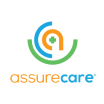

.png)
.png)
.png)



Leave a Comment